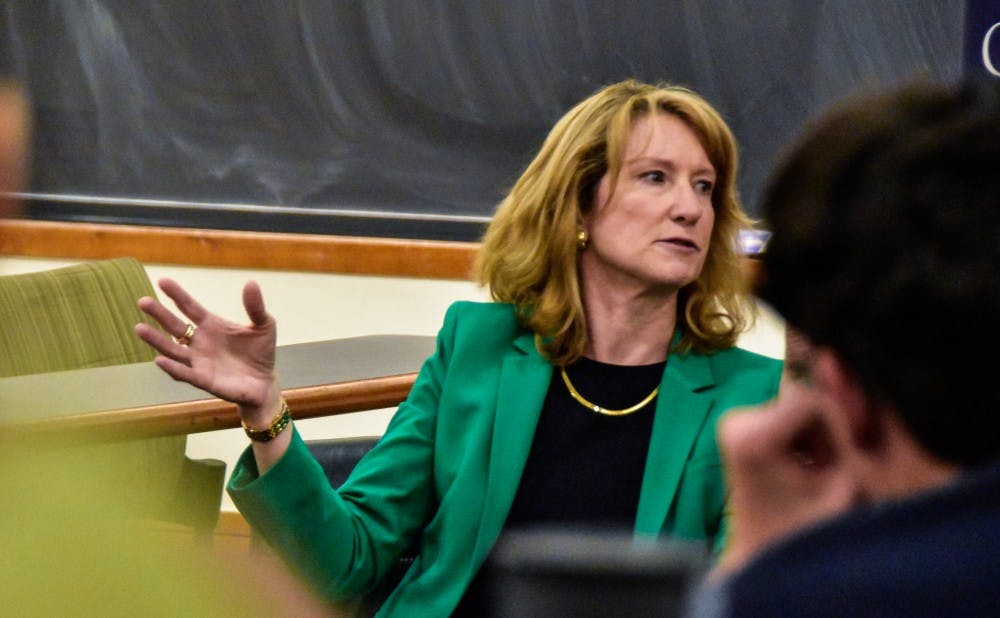After 32 years of civilian and military service, Lisa Disbrow concluded that the complex structure of the U.S. government is what ensures the strength of the nation at a talk Tuesday evening.
Sponsored by American Grand Strategy and the political science department, the talk brought Disbrow to Duke to discuss her extensive service, which included serving as undersecretary of the Air Force from February 2016 to June 2017 and a stint on the Joint Staff from 1995 to 2014. In these roles, her responsibilities involved coordinating with the Department of Defense, the National Security Council and other governmental and private agencies such as think tanks.
Communicating military matters with these agencies, each with its own culture and working style, is sometimes challenging, Disbrow acknowledged. However, the checks and balances between the agencies are necessary for the government as a whole to function properly, she said.
“It’s complex, it’s frustrating," Disbrow said. "There’s some bureaucracy, but it is that complexity that maintains our freedom—because you hear the different perspectives that you probably have a [blind spot] in understanding.”
As a member of the military, Disbrow explained she remains nonpartisan and apolitical, though her posts on the Joint Staff often exposed her to politically sensitive issues.
“I believe [the arrangement] is healthy because you are always looking for what works the best for the nation,” Disbrow added. “But [officers that are more political] come in with a clear agenda even when they don’t understand the issue.”
Political officers often claim that they are speaking on behalf of the general public and in the name of democracy, said Peter Feaver, professor of political science, who moderated the talk. However, it is not always clear to them what the direct consequences of their choices are.
Disbrow said she believes it’s important to raise counterarguments in the decision-making process. Her identity as a civil servant makes it easier to carry out that responsibility, she said.
“In many ways, it is easier in my career as a civil servant to speak truth to power because my career is only indirectly impacted by a president,” she said.
Feaver noted that in the last five years, countries such as China and Russia have been actively reinforcing their air force capability, threatening U.S. air supremacy. He asked Disbrow how she and her colleagues in the Air Force managed that situation.
Disbrow responded that in the aftermath of the 9/11 attack, the U.S. military shifted its focus to counterterrorism. The military budget was reconfigured to prioritize growing ground forces and special operations forces.
Completely transitioning to unmanned aircraft was not a feasible option, she said. Technology that enabled pilots to remotely accomplish their missions to the fullest extent was not available, and the military also saw little reason to abandon perfectly functional manned aircrafts.
“You cannot flip a light switch and just say ‘OK, we get to go all unmanned,’” Disbrow said.
Without the political complexities, and with more government subsidies, the adversaries of the United States might be more efficient at implementing new technologies, Disbrow remarked. But the United States is more active in research and innovation.
“One of the strengths of our country is that private institutions such as universities and think tanks can explore technology research—not on behalf of the government—[but it] actually ends up helping the government later,” she noted.
Many of Disbrow’s work environments throughout her career were male dominated, but she said that she didn't feel disadvantaged in any way. What she focused on was whether she was adding value and doing a great job serving the country, she said.
During her service as the undersecretary of the Air Force, Disbrow also witnessed a national discussion regarding whether women and members of the LGBTQ+ community receive equal treatment in the military.
Although women used to be excluded from combat, all careers in the military are now open to men and women who are qualified, Disbow noted.
She cited an Air Force survey showing that U.S. pilots didn’t seem concerned with the race, gender and sexual orientation of their comrades.
“It tends to be the people who are outside the service who really care,” Disbrow said.
Get The Chronicle straight to your inbox
Signup for our weekly newsletter. Cancel at any time.

